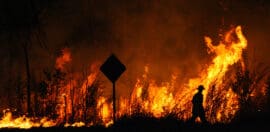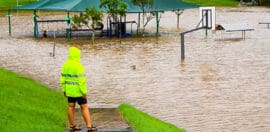Australia ranks ‘very low’ on climate action performance

15 November 2022 at 4:46 pm
Australia’s emission reduction targets, fossil fuel exploration and lack of international climate finance contributed to the poor result.
Australia’s environmental protection efforts continue to be among the lowest in the world, ranking 55th out of 63 possible places in the Climate Change Performance Index 2023. The first three positions of the index were not filled as no country is performing well enough to prevent climate change.
The annual index, launched during COP27, assesses the climate protection efforts and progress of countries collectively responsible for more than 90 per cent of global emissions. It aims to increase transparency in international climate politics.
Countries faring worse than Australia include Iran, Saudi Arabia and Kazakhstan, while Denmark, Sweden and Chile led the ranking.
It is a slight improvement on last year’s results for Australia, which ranked 59th overall and last for climate policy, one of the four performance assessment categories for the index along with greenhouse gas emissions, renewable energy and energy use.
Nicki Hutley, an economist and councillor at climate change communications organisation Climate Council, said the results are an alarming wakeup call for Australia’s environmental policies, showing “there is no time to lose” when it comes to addressing the climate crisis.
“Australia has gone from dead last to far from a pass, and despite the nation’s recent progress, there is no escaping just how far behind we are and how much catching up we’ve got to do,” said Hutley from COP27 in Egypt.
“While Australia remains in the very low performing countries, the index as a whole also reveals just how far the world at large needs to step up if we’re to avoid catastrophic levels of warming.”
The Australian government handed down a climate-focused federal budget in October and a raft of initiatives to accompany the spending.
But despite the government legislating emissions reduction targets of 43 per cent by 2030 and net zero by 2050, these still remain among the weakest in the developed world. Its safeguard mechanism, intended to play a key role in these targets, has also been criticised as insufficient, while other clean energy initiatives are at too early of a stage to demonstrate effectiveness.
Australia still doesn’t have a timeline for phasing out coal and gas production, and continues to subsidise fossil fuel infrastructure, exploration and extractions. According to the index, Australia is “among the nine countries responsible for 90 per cent of global coal production and plans to increase coal and gas production by over five per cent by 2030 [which] is not compatible with the global 1.5°C target”.
Lastly, Australia is falling short in contributing to international climate finance – a key focus of COP27 – with the country not joining initiatives including the Global Methane Pledge or Powering Past Coal Alliance, or re-joining the Green Climate Fund.
Hutley said heavily investing in clean energy is key to Australia’s financial prospects and reputation in the global arena, particularly as its regional neighbours continue to be acutely impacted by climate change.
“Good climate policy is good economic policy. We know the costs of inaction are skyrocketing, and we know that making the most of Australia’s vast, untapped renewable energy potential is the path to Australia’s future economic prosperity, just as it is essential to protecting vulnerable communities in Australia, the Pacific and beyond,” she said.
“Next year, Australia needs to have skyrocketed up this index and COP27 provides the ideal platform for us to get cracking. Minister [for climate change and energy] Chris Bowen is now here at the conference in Egypt and as a start, he must commit to an end date for fossil fuels and increase support for vulnerable communities in our region and beyond.”
The Climate Change Performance Index has been published by Germanwatch, NewClimate Institute and Climate Action Network International since 2005.
Climate and energy experts from The Australia Institute, WWF, Doctors for the Environment Australia and Sustainable Business Australia contributed to the climate policy evaluation of Australia for this year’s index.







